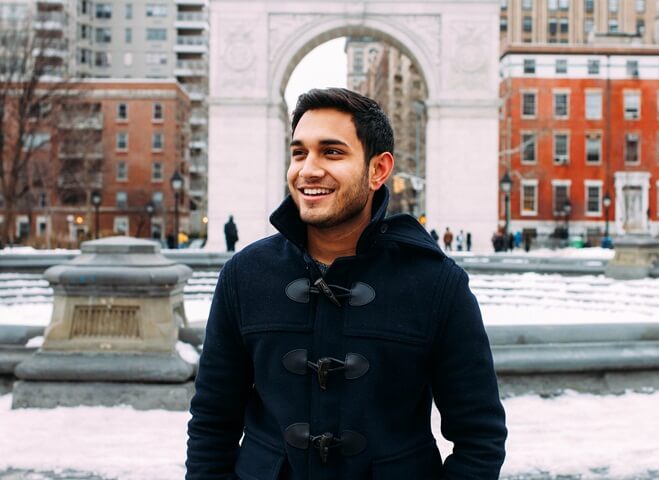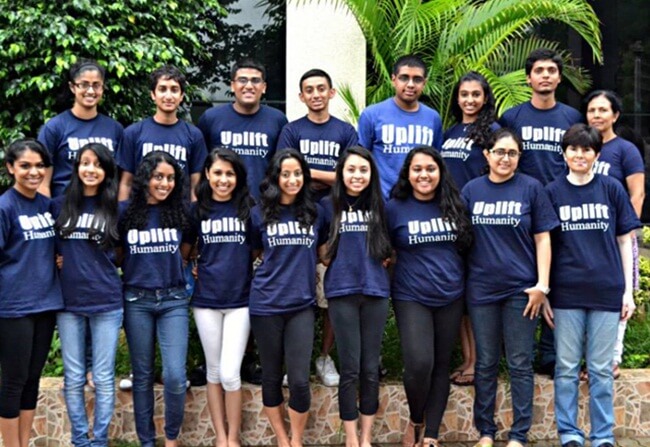“If you want to lift yourself up, lift up someone else.” That’s what 22-year-old Indian American philanthropist Anish Patel from New Jersey believes in. He formed Uplift Humanity India, a New York-based non-profit organization, in 2010. Since then he has been working for the rehabilitation of juvenile inmates and orphans in India. He and his team of young volunteers from across USA have been making difference in the lives of the underprivileged in Hyderabad, Delhi, Mumbai and Gujarat with various educational programs. The story of what motivated the then 16-year-old Anish Patel to work for upliftment of juvenile criminals in India is truly inspirational.
Indian Eagle catches up with Anish Patel, the founder of Uplift Humanity India, to share with you his journey as a young philanthropist from USA to India, his rehabilitation programs and his milestones in philanthropy in the following interview at Travel Beats, a community portal for Indian Diaspora.
IE: We know the story behind the inception of Uplift Humanity India. What appealed to you so strikingly at the age of only 16 on a summer day in India that you formed Uplift Humanity India, a non-profit organization?
Anish: I don’t think there was one striking event; it was the realization that something needed to be done. As a kid, I used to travel to India every summer, so I was immersed in the culture and knew more about the social problems than most American kids. I felt a sense of responsibility – or duty – to do something. Most people are intrigued that I chose to work with juveniles and orphans. People were surprised; they would say, “Why work with kids who have committed a crime?” But that’s the very reason I wanted to work with that sector of the population. If no one was going to help them, how would they learn to improve and to be productive members of society?
IE: How supportive were or have your parents been during your journey as a philanthropist?
Anish: My parents have been very supportive. My dad’s an entrepreneur so he is familiar with the challenges of starting a business and growing it from the ground up. My mom is also supportive, but just like every mother, she gets stressed when she sees me working so hard late at night. It’s cute.
IE: What role do you play in the current functioning and projects of Uplift Humanity India?
Anish: I’m the CEO, so my role ranges from managing our day-to-day tasks to providing strategic guidance for our directors and volunteers. Sometimes I enjoy taking a step back and watching the team drive the strategy, other times I like to get my hands dirty.
IE: You have built a community of volunteers from across USA to work on your missions in India. How did you approach them to travel thousands of miles to India and convince them about your non-profit projects?
Anish: Looking back, one of the hardest things in the beginning was recruiting students to volunteer with us. It was challenging to gain the trust of parents – parents didn’t want to send their kids 8,000 miles away to volunteer for a few weeks. When we first started, we went and put up flyers in libraries, grocery stores, community centers, and even local coffee shops. It was the combination of that and social media that helped us find our first batch of our students to India. But marketing the program became much easier after the first year. After volunteers returned from the first trip, word just spread naturally. Students actively wanted to volunteer with us because they themselves wanted to make an impact.
IE: Who would you like to thank the most for the milestones you have achieved in your philanthropic pursuits till date?
Anish: I think my team. I don’t think I say thank you to them enough. We work so hard that at times we don’t stop to reflect back on all that we have done. I’m so grateful for the amazing team that runs Uplift. Whether they work in our admin team or are one our teachers on-site – each and every person plays a special role behind the success of Uplift Humanity.
IE: Over the past six years, 250 volunteers from USA participated in rehabilitation programs for over 500 juvenile inmates at the Indian centers of Uplift Humanity. What challenges or difficulties have you faced till date to make it possible?
Anish: Funding is still one of the biggest challenges for us. We could do so much more with more funding. Every dollar that we raise goes directly to funding our education efforts in India. While funding is hard for every nonprofit, I think it is especially challenging for us. Our team consists mostly of younger individuals, and I think others are hesitant to donate to us because of that. They think we might be inexperienced. But I think our young team is the secret sauce behind Uplift’s success. Every person that works for us is so unbelievably smart, passionate, and hardworking.
IE: You have chosen education as the medium of rehabilitation as you believe that education is a right, not privilege. What kind of educational programs do you conduct to rehabilitate the socio-economically challenged children in India?
Anish: We have several programs at Uplift. We first started with our life skills program, a curriculum in which we empower our students by teaching them skills like anger management, self-esteem development, how to deal with peer pressure, and other necessary skills. Through these skills, our students learn how to successfully assimilate back into society and be productive members of their community. We also launched our Academic Program this year, where we teach spoken English and provide vocational training. The Academic Program has quickly turned into one of the most important things that we do at Uplift. By teaching our students how to speak English, we’re providing them with the skills necessary to receive employment.
IE: What are the parameters to measure the improvement of children at juvenile centers or orphanages during year-round academic programs or special summer programs?
Anish: Everything must be measured. At Uplift, we regularly provide progress checks and exams to ensure that no child is left behind, and that our programs are as effective as possible. Our exams are both verbal and written, to ensure that our students are able to communicate the material they learned through a variety of ways. Every year, we update and make changes to our curriculum, innovating to make sure our programs are even more powerful.
IE: Is there any special curriculum for the juvenile inmates and underprivileged children with learning or development disability?
Anish: At this time, we don’t work with students who are disabled. We’ve been focusing our efforts to at-risk youth – kids who are either behind bars or in orphanages. We believe that the more narrow our focus, the more effective and targeted our programs are.
IE: How do the US-based volunteers from a different socio-cultural background connect with the juvenile inmates or orphans in India? do they themselves undergo any training before traveling to India and work in the projects of Uplift Humanity India?
Anish: We actually don’t provide much training to our volunteers. We allow our volunteers to be natural and unfiltered – it allows them to create these unforgettable bonds with the students. It’s really amazing. What people don’t understand is that these kids we are teaching are just kids. That means many of the same problems, like bullying or peer-pressure, that our students in India may face, are also the same problems that our volunteers face. One would think that these kids would not be able to relate to each other, but in reality, they are able to build such strong bonds. By the end of the trip, they are calling each other “bhai” and “bhen”, which really signifies how closely they have connected.
IE: What happens to or becomes of the children after the educational programs are over? George Bernard Shaw’s Pygmalion, an early 20th century drama, reminded me of this question to you. In the play, an eminent professor of phonetics picked a girl from a slum and taught her the refined art of speaking and the gentle manners of a civilized society without thinking what she would do once the training was over. It was not possible for the girl to go back to the slum and live her previous life.
Anish: What is great about our programs is that we are constantly looking at the end goal, which is employment. We don’t want to just stop at education; we want them to ultimately find personal success and be productive citizens. Once we educate our students with the necessary skills, we work to bridge the gap to ensure they don’t revert to criminal activity as a source of income. In other words, we want to make sure that our students are able to find jobs right after they are released. To us, that is success.
IE: Something about the future plans and goals of Uplift Humanity India.
Anish: We’re constantly looking to expand. We’ve done so much in the past six years, but we have so much more to do. Our team gets so excited every time we launch a new program or a new city to work in. For us, we want to start working in more cities across India, and educate even more juveniles and orphans. Even though it’s not about the numbers for us, we’re constantly looking for innovative and sustainable ways to grow.
Travel Beats is a community portal by Indian Eagle, a leading travel organization for Indians in USA. Indian Eagle connects with Indian Americans and connects them with India through NRI news, editorial features and interviews on Travel Beats. As part of its CSR activity, Indian Eagle writes about philanthropists and social activists from the Indian community to promote their contributions towards community development, social progress and Humanity.









Kind of work these youngsters are doing for orphans is appreciable.I wish Anish and his team best for their social work.